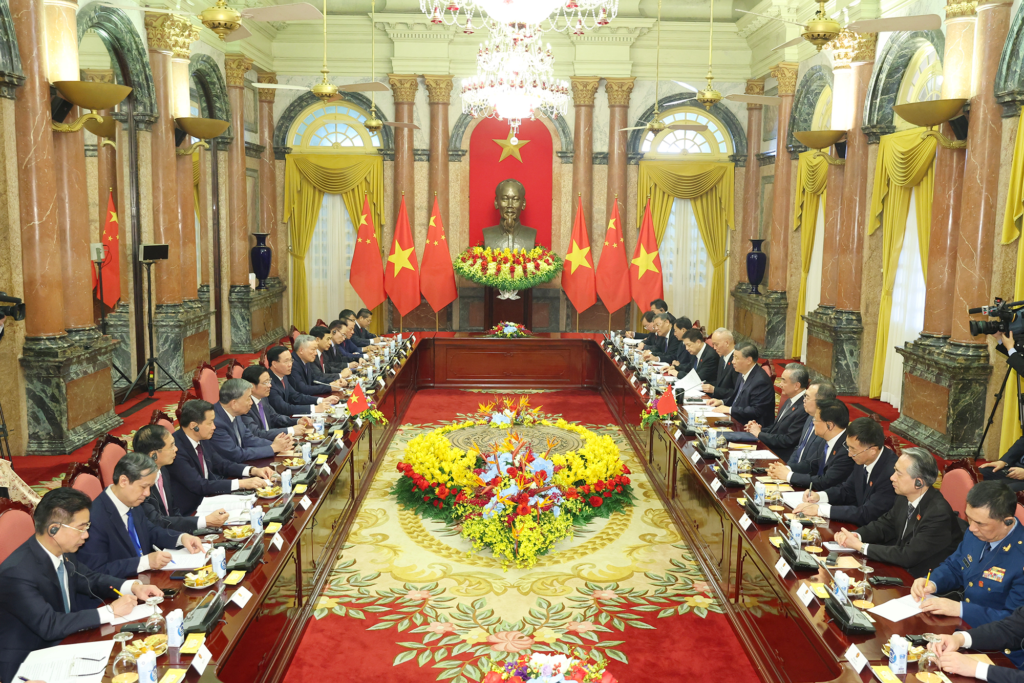From Tuesday to Wednesday, Xi met with senior leaders of Vietnam including General Secretary of the Communist Party of Vietnam (CPV) Central Committee Nguyen Phu Trong, Vietnamese President Vo Van Thuong, Prime Minister Pham Minh Chinh, and Chairman of National Assembly of Vietnam Vuong Dinh Hue. Both sides had a profound and comprehensive discussion about the bilateral relations and the issues that concern both sides.
As a socialist country with the leadership of a communist party, Vietnam has wisdom to handle its relations with major powers worldwide properly, and Hanoi won’t be used by hegemonic powers to confront its neighbor, and the deep traditional party-to-party ties and the lesson of history will make sure the China-Vietnam relations are able to withstand challenges and interruptions, and to effectively combine the advantages of each other to realize better development to serve the interests of the two peoples, said experts from the both countries.
Deep friendship
In meeting with Vuong Dinh Hue on Wednesday, Xi said the announcement to build the China-Vietnam community with a shared future that carries strategic significance sends out a positive signal of the two socialist countries’ commitment to solidarity, friendship and joint development.
On Wednesday afternoon, Xi met representatives of youths and friendly personages from the two countries at the Vietnam National Convention Center in Hanoi, and delivered a keynote speech. When Xi and Trong entered the venue, all attendees stood up and gave a round of applause, and a classic Vietnamese song about the traditional revolutionary friendship between the two countries “Vietnam-China” was played.
Xi recalled the traditional revolutionary ties between the CPC and CPV, as well as Chinese and Vietnamese people during his speech. “In Vietnam’s War Against French Occupation and its War Against US Aggression to Save the Nation, more than 1,400 Chinese officers and men gave their lives, and they now rest in peace in Vietnam. More than 5,000 injured Vietnamese soldiers were treated in Nanxishan Hospital in Guilin, Guangxi, and over 10,000 Vietnamese students received education in Yucai School there.”
Xi also mentioned the present close bond between the two countries, saying that “Both Chinese literature classics and contemporary Chinese film and television productions are popular in Vietnam. Some Vietnamese pop songs are huge hits on Chinese social media, and Vietnamese singers who appeared in Chinese TV shows have won many fans in China.”
Xi said, “The foundation of China-Vietnam friendship lies among our two peoples, and the future of this friendship will be created by the young people.” He further expressed three wishes to the youths and friendly personages of the two countries: “First, I hope that you will carry forward China-Vietnam friendship and play your part in building a China-Vietnam community with a shared future that carries strategic significance; Second, I hope that you will play your part in promoting the development of the Asia-Pacific and contribute to enduring peace in our region; Third, I hope that you will be pioneers in promoting human progress and contribute to the building of a community with a shared future for mankind.”
Nguyen The Su, a member of Vietnam-China Friendship Association and retired professor of Chinese Studies Department of Hanoi University, attended the event. Nguyen The Su told the Global Times on Wednesday that the youths in Vietnam need to remember that during Vietnam’s war against US aggression, “China presented selfless support to us, and China also assisted us in the construction of socialism in Vietnam,” and today, “our ties have been promoted to a higher level, we are all proud and happy.”
The most impressive part of Xi’s speech is that he expressed great hope to the next generation, and this is our job to make the traditional friendship to be inherited to the younger generations, said the professor. “A good sign is that, recently, not only in Hanoi University, but also in many major universities across the country, more and more students have started to apply for Chinese studies. Sometimes, the students we’ve received in the Chinese Studies Department have surpassed those in the English Studies Department.”
Li Haidong, a professor at the China Foreign Affairs University, told the Global Times on Wednesday that the China-Vietnam relations are driven by the fundamental interests of the two peoples, and the most important characteristic is that the two countries are ruled by communist parties, so the two countries don’t just share mutual benefits in terms of economy and trade, but also share the same goal to safeguard political security and shared ideology. “This is a unique characteristic that drives the two sides to build a community with a shared future.”
Stay alert to external interruption
Xi said during his visit in Hanoi on Wednesday that China and Vietnam should be alert to and oppose any attempts to mess up Asia-Pacific, Xinhua reported. The two sides should strengthen coordination and cooperation in international affairs and jointly maintain a favorable external environment, Xi said in a meeting with Vietnamese Prime Minister Pham.
For his part, Pham said Vietnam-China relations have withstood the test of time and history and will not be affected by any interference provoked by external forces.
According to a joint statement issued Wednesday, leaders of the two countries held an in-depth and candid exchange of views on maritime issues during the visit, with both sides stressing the need to better manage and actively resolve maritime disputes, so as to safeguard peace and stability in the South China Sea and the region at large.
Xi said on Tuesday during the meeting with Nguyen Phu Trong that “China and Vietnam should work closely on international and regional issues,” noting that the remarkable development achievements of the two countries are the result of both the hard work of both sides and an open and inclusive world, especially a peaceful and stable Asia-Pacific.
Vietnam adheres to an independent foreign policy and takes developing relations with China as a top priority and strategic choice, Trong said. Maritime disputes are only part of Vietnam-China relations, and it is believed that the two sides can properly handle them in the spirit of mutual trust and mutual respect, Trong said.
Li said, “as China and Vietnam further develop their ties to a higher level, we should stay alert to the intervention and interruption from hegemonic forces outside the region, especially the ones from the US, as Washington intends to use disputes in the region to serve its strategic goal to compete and contain China.”
When China and Vietnam closely work with each other to build a community with a shared future, it will automatically help the two sides to jump out from the trap of confrontation, but will share their unique and special advantages and opportunities to boost joint development, said experts, adding that this might be seen in the fields like high-speed railways, semiconductor and artificial intelligence.
“We do have reason to believe that the bilateral ties could be brighter, more stable, and healthier. Vietnam and China have gone through a series of challenges and tests in different stages of history. The most important task for us right now is to develop our economies, to improve the livelihoods of our two peoples,” said Bui Trong Van, former minister counselor at the Vietnamese Embassy in China.
Van told the Global Times on Wednesday that “The leaders of the two countries have signed so many agreements and reached so many consensuses, which means they have very detailed plans for the future. This is the reason why I’m confident.”




